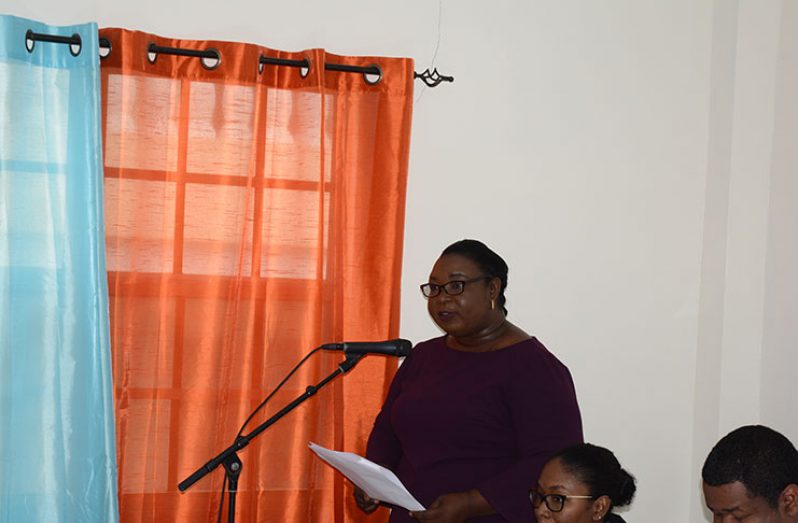– teachers can be effective eyes for healthcare system
MANY risk-taking behaviours such as substance abuse start during adolescence and mental health amongst this group is largely undiagnosed, untreated or mismanaged resulting in disastrous consequences.
This is according to the Director of the Mental Health Unit Dr. Util Richmond-Thomas during her remarks at a recent mental health training forum for teachers.
The event was held at the Mental Health Unit, Ministry of Public Health Quamina Street, South Cummingsburg Georgetown. Head teachers made up majority of the participants.
Dr. Richmond-Thomas said metal health issues affect about 13-15 per cent of adolescents while hopelessness and anxiety are among the leading causes of depression, and at its worst can lead to self-harm or suicide.
This, she said, is the third leading cause of death in persons 15-19 years old.
“This situation is not unique to Guyana but is an affliction of many developing countries; this is largely due to insufficiency of mental health professionals within the health care system, as well as lack of adequate knowledge by health care workers to screen for, detect and manage mental health issues appropriately,” the doctor said.
She added that the importance of the wellbeing of children and adolescents cannot be over emphasized since they are the future. Dr. Richmond-Thomas said one in six persons affected by mental health issues is aged 10–19 years.
“Stigma and discrimination also affect persons, and prevent affected persons and their family members from seeking help. I am proud to say that the mental health unit and Guyana have turned a corner over the past three years since the unit has been very busy training hundreds of health care workers to screen for, diagnose and manage the most common mental health disorders, among them are more than 100 doctors from primary health care,” Dr. Richmond-Thomas said.
Noting that mental health disorders include those that commonly affect children and adolescents, the mental health director said referrals are being made from the Ministry of Education and enough capacity has been built on the ground to start addressing the mental health needs of young people through primary health care.
Meanwhile, she said the harmful use of alcohol, marijuana and other substances of abuse is increasing among teenagers, and so are the risk-taking behaviours such as unsafe sex which can lead into sexually transmitted diseases, early pregnancy and unsafe abortions.
Additionally, she said such can result in the perpetration of violence which can increase the likelihood of low educational attainment, injury, involvement with crime, or death.
“Teachers are in a strategic position since they have our children more waking hours per day than we ourselves, it makes sense to empower them on how to coach children and adolescents on how to care for themselves, by developing and maintaining their social and emotional habits important for wellbeing; these include taking regular exercises, develop problem solving and personal skills,” the doctor said.
She added it also makes sense to empower teachers with techniques of creating a supportive environment in school, so that children and adolescents who are facing challenges have a soft place to fall.
The Mental Health Director noted teachers can be effective eyes for the healthcare system, in detecting those children and youth who need mental health care and to channel them through the health care system.

“Teachers can also be the eyes of society to detect, report and seek help for students affected by mental health, such as violence in cases of sexual violence, bullyism, discrimination, educational difficulties and human rights violation,” she said.
The Director stated that the Ministry of Public Health and the Ministry of Education have commenced a partnership to ensure that young people thrive, reach adulthood and achieve their full potential.
Meanwhile, Senior Psychologist at the Mental Health Unit, Dr Balogun Osunbiyi, noted that some adolescents are at greater risk of mental health conditions due to their living conditions, stigma, discrimination or exclusion, or lack of access to quality support and services.
These, he said include adolescents living in fragile settings; adolescents with chronic illness, autism spectrum disorder, an intellectual disability or other neurological condition; pregnant adolescents, adolescent parents, or those in early and/or forced marriages; orphans, and other discriminated groups.
The Psychologist noted that the promotion of mental health and well-being helps adolescents in building resilience so that they can cope well in difficult situations or adversities.
These programmes, he said require a multilevel approach with varied delivery platforms as can happen in social care settings, schools, or the community.
But, for nineteen year-old Shawn, (not his real name) his experience with depression started when he was 12 years old.
The Georgetown resident said the cuts on his inner right arm are scars from the journey he wishes never to repeat.
Shawn who is from a single parent home said for many years he never spoke to anyone about how he was feeling and what was happening inside his head.
“It’s been a struggle of relapses and recovery. Sharing my story makes things easier, but depression can suddenly creep up on you without any warning; my mother never knew for many years what I was going through,” he said.
He said all of his energy was drained in isolation and negative thoughts, something for which he received counselling.
“I never really talked about it much with anyone because I didn’t want to be called a mad man or for anybody to talk about me behind my back, it’s not easy you know, but I am happy for all these new services so youths can get professional help,” he said.
He continued: “There were so many things I didn’t understand. I definitely didn’t realise that anyone, including myself, could develop a mental health problem. But as far as I am concerned we all have mental health problems, but we need to be guided through it so it doesn’t destroy us, I am thankful and am happy for the services being provided.”












